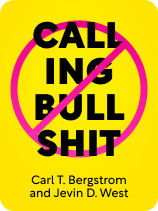

This article is an excerpt from the Shortform book guide to "Calling Bullshit" by Carl T. Bergstrom and Jevin D. West. Shortform has the world's best summaries and analyses of books you should be reading.
Like this article? Sign up for a free trial here.
What does “bullshit” mean? Is it just another word for misinformation? Is it different from rhetoric?
According to professors Carl T. Bergstrom and Jevin D. West, bullshit is defined as the use of misleading evidence to persuade an audience. They emphasize the importance of the phenomenon’s intent and how it’s put into operation.
Read more to understand how to define “bullshit” according to Bergstrom and West in their book Calling Bullshit.
The Meaning of Bullshit
Bergstrom and West define bullshit as the use of misleading evidence, without regard for the truth, to sway an audience by confusing or overwhelming them.
This definition, they point out, has two key aspects. First, the bullshitter appeals to evidence that obscures the truth rather than illuminates it. For example, this might involve using bombastic language that makes it difficult for an audience to follow the argument. Alternatively, this could involve using statistics or data taken out of context.
(Shortform note: Although he wouldn’t have recognized the term “bullshit,” the Greek philosopher Plato shared Bergstrom and West’s disdain for obscuring the truth. Plato harshly criticized the discipline of rhetoric in the Gorgias, arguing that rhetoricians treat evidence as a means to persuade their audience rather than as a path to the truth.)
Second, Bergstrom and West say, the bullshitter bears no commitment to the truth. This lack of commitment manifests in two ways. Most obviously, it can manifest when someone actively seeks to undermine the truth, such as by intentionally making false claims to advance a political agenda. The lack of commitment can also manifest when someone is simply indifferent to the truth, such as a comedian who embellishes her stories for the sake of entertaining a crowd. For such entertainers, the truth is simply irrelevant.
(Shortform note: Another way that bullshitters can shirk the truth is through self-deception, or convincing themselves of falsehoods to justify behavior that they would find objectionable in others. According to researchers, self-deception is a well-established phenomenon—in one experiment, for instance, participants playing the role of investment advisors were more likely to recommend a risky portfolio as the best option if they received a commission for guiding investors to that choice. They convinced themselves that the risky option truly was superior, even though control groups that received no commissions consistently recommended the less risky option.)
Crucially, Bergstrom and West add that black boxes can immunize bullshit from criticism. Black boxes, they explain, are highly complex sources of evidence that laypeople are not equipped to evaluate. For instance, a climate change activist might appeal to projections from the Dynamic Integrated Climate Change Model to argue that the threat of climate change is more serious than most assume. Because this multivariable climate model lies beyond the expertise of most laypeople, it constitutes a black box that is effectively beyond reproach.
(Shortform note: Although Bergstrom and West are borrowing French philosopher and anthropologist Bruno Latour’s understanding of “black boxes,” the term itself dates back to at least 1945, when researchers of electronic circuit theory used the term to describe circuits characterized by their responses rather than their internal mechanisms. In other words, black boxes were circuits that delivered correct outputs, even if we didn’t understand how these circuits worked.)

———End of Preview———
Like what you just read? Read the rest of the world's best book summary and analysis of Carl T. Bergstrom and Jevin D. West's "Calling Bullshit" at Shortform.
Here's what you'll find in our full Calling Bullshit summary:
- That misinformation online, in news, and in academia is spreading
- How to detect and refute bullshit in its many forms
- How data can be miscollected and misinterpreted in science






